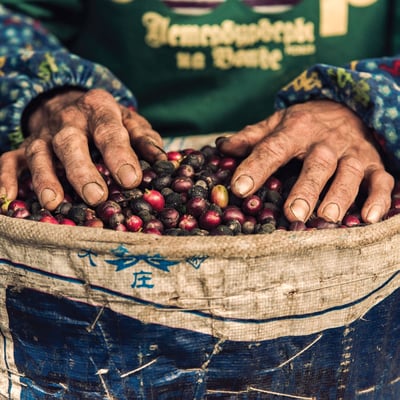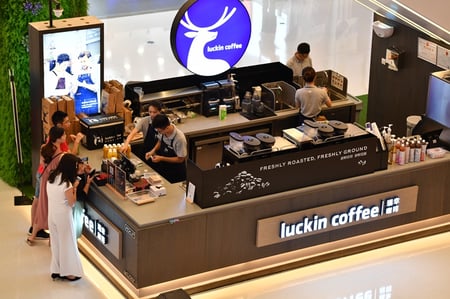Brewing Up Success: The Rise of Coffee in China
Chinese consumers are looking for a higher quality standard in their coffee, which is why the market is going through a rapid transformation. Some of the best coffee shops in the world are opening up in China at a staggering pace. Both instant coffee and premium brands are starting to proliferate in the region.

Instant coffee consumption has been on the rise in China since Nestlé entered the market in the 1980s. And while overall consumption has historically been low, Chinese coffee consumption is now growing by a staggering 30% every year.

Coffee expansion
Even though tea dominates China's drink of choice and is likely to remain so, coffee is becoming increasingly popular as a Western symbol of status and prestige, as well as a favorite after-dinner drink. Coffee consumption in China has grown rapidly over the past four years and is growing steadily. While coffee consumption per capita in China is still well below the European or US average, it is rising sharply in metropolitan areas, especially in large metropolitan areas.
In recent years, coffee culture in China (defined by increased coffee consumption and coffee-related activities) has become all the caffeinated buzz. As early as 2004, coffee trends was described as "café culture"; that includes coffee shops, cafés, restaurants, coffee vending machines, etc. The growth of Chinese coffee culture is supported by the rising household incomes and more Chinese traveling overseas, where they discover Western-style coffee culture first hand.
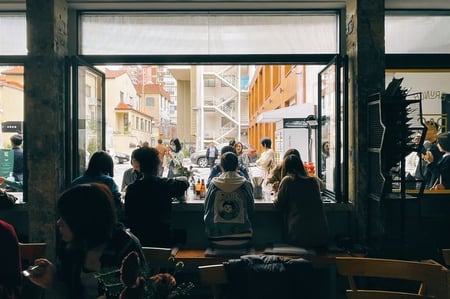
“For example, California-based Blue Bottle Coffee opened its first store on the Chinese mainland yesterday. It is housed in a historical building near Suzhou Creek in Shanghai as the company prefers to inject new blood into old structures.It is the latest addition to the company's global network of 102 cafes, as well as the latest international brand vying for a piece of the booming local coffee market.
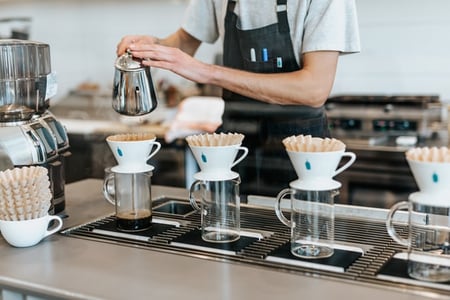
"China is a strategic market for Blue Bottle Coffee and one where we see a long future for ourselves," said CEO Karl Strovink. The store offers the company's classic drip coffee and the same signature espresso-based drinks as its other global locations because it aims to serve local guests with the same freshly roasted, high-quality specialty coffee as every location around the world....But here's one thing special: All coffees are roasted in small batches at the Blue Bottle Coffee Shanghai Pengpu Roastery. It was established to provide fresh and delicious coffee for its stores on the Chinese mainland as it has ambitious plans to expand its domestic network.”” -shine.cn
The expansion of Blue Bottle in Shanghai is a huge step forward for the company and for the coffee industry in Shanghai. People were lined up around the building, waiting to pay premium price for premium coffee.
Currently, coffee consumption per capita in mainland China is only five cups per year, while in the United States it is 400 cups per year, and in European countries such as Norway and Sweden, it exceeds 1,000 cups per year. The population of China drinks much less coffee per person than the population of the West. Despite the rise in coffee consumption in China, this drink is unlikely to replace tea as China's favorite drink anytime soon. Don't forget that tea is very cheap, a national drink that is thousands of years old; so coffee has a lot of competition in China.
The expansion of coffee in China means that there's a cafe on almost every street corner in every major city on the mainland. China has been experiencing a coffee revolution in recent years, leading their market with their own premium coffees.
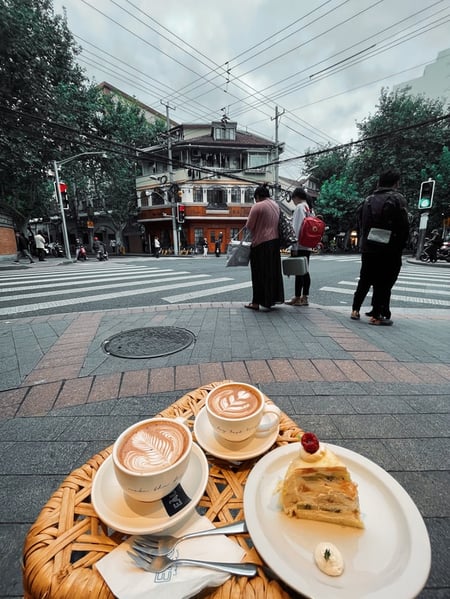
China is one of the biggest markets for coffee by volume. Starbucks entered China on November 25th, 1999. This came at a time when China's coffee consumption was low. However, in the following years, China's coffee consumption snowballed.
Important years for Starbucks in China:
Starbucks.com
- 1999 - Starbucks opened its first store in mainland China in Beijing.
- 2009 - In celebration of its 10th anniversary in mainland China, Starbucks introduced its first blend that includes coffee beans from Yunnan province - South of the Clouds.
- 2011 - Starbucks refreshed its logo and launched My Starbucks Rewards program.
- 2012 - Starbucks University (China) was established.
- 2012 - Starbucks first Farmer Support Center in Asia was established in Pu’er, Yunnan province.
- 2013 - Starbucks China launched its first two flagship stores in Beijing.
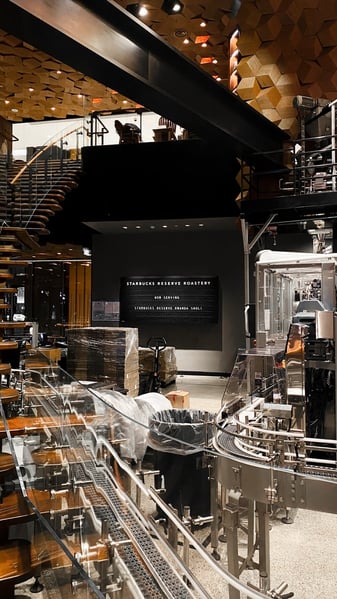
It may seem odd that a tea-focused country like China is becoming more and more famous for growing an exceptional coffee variety. Along with Starbucks, local coffee brands such as Manner, Seesaw and M Stand have also won the hearts of Chinese consumers with special coffee offerings.
Take Manner for example. Another coffee shop that is seemingly everywhere in China. Manner's store designs are minimalist in nature, with stark white walls and muted lighting, not unlike the look of Apple or Google stores. But contrary to the tech giants, Manner doesn't rely on just one product. Manner's business model is much broader, taking in a range coffee related products to please the young and enthusiastic community of students and workers.

Western chains such as Starbucks, Coffee Bean & Tea Leaf Whitbread Group, Costa Coffee are undoubtedly dominating the Chinese market, and the presence of national chains and independent cafes is an important alternative. Starbucks remains the dominant player with nearly 60% of the coffee market in mainland China.
China seems to be stuck in the second wave of coffee, and international coffee chains still dominate the Chinese coffee market. While Starbucks has played a key role in bringing coffee to mainland China, Chinese consumers can now meet their caffeine needs elsewhere. In fact, China, once only among the top 30 coffee producers in the 1990s, is now among the world's top 20 coffee producers. In fact, China has gone from being the world's 30th largest coffee producer in the mid-1990s to one of the world's top 20 coffee producers today.
Yunnan, China
If you want to set foot on the ground floor of an exciting growing coffee growing region, don't sleep in Yunnan, China. The fact that leading US coffee roaster La Colombe now offers specialty Chinese beans is a sure sign that Yunnan is making headway.
Photo Courtesy of Bryon Lippincott
China is a huge market for the best coffee beans in the world, with Chinese companies bidding higher than North American, European and Australian companies to offer the best coffees on the market. With this comprehensive picture of the emerging Chinese specialty coffee market, you are fully prepared to shop for the finest Chinese coffee beans. Although this number fluctuates between 10% and 15% of current consumption in the European Union and the US respectively, the potential of the Chinese coffee market is huge.
In 2015, coffee sales in China accounted for only 0.5% of the global market. China is also expected to import 120 million kilograms of instant coffee in 2018/19. According to a USDA report, China is expected to import 48 million kilograms of roasted and ground coffee in 2018/19.
In 2016, China ranked among the top 20 Arabica coffee producers with a production of 158 million pounds, placing China among the top 15 Arabica producers in the world and currently consuming more coffee than Australia.
At present, 95% of the coffee in mainland China is produced in Yunnan, with an annual output of more than 100,000 tons of coffee. Most of the coffee is produced in Yunnan, where ethnic minorities live in Southwest China. Yunnan is the largest producer of coffee in China, mainly producing Arabica coffee, which is then exported to Europe.
Today, Yunnan accounts for about 95% of China's coffee production, with the rest being grown in Hainan and Fujian. Most Yunnanese coffee is exported to Germany and Japan, but a few years ago Starbucks began offering coffee drinks in its Chinese stores that used Yunnanese coffee beans. Thanks to the unique taste of green coffee and the conservative efforts of the region to develop its cultivation, the popularity of Yunnan coffee in the specialty coffee industry is growing.
Their Natural coffee beans, single origin coffee from China's Yunnan province, are our favorite Chinese coffee beans this year. This Chinese coffee has a relatively mild flavor, making it a valuable addition to blends and delicious single-origin coffees. Beans from this region contain a mixture of phosphoric and malic acids, which gives the green coffee a bright fruity taste.
In southern Yunnan Pu'er, some people drink Pu'er tea mixed with whole coffee beans. Pu-erh tea is famous in China for its unique taste and unique processing methods. It's no surprise that Starbucks offers some unique tea options in China. If you find yourself needing a cup of coffee in China, chances are you'll get it at Starbucks.
Tea might be the first thing that comes to mind when you think of China, but the renowned tea-growing region of Pu'er, Yunnan province, has also quietly built up a reputation for some of the best coffee grown in Asia. Large companies like Nestlé have used coffee from Yunnan since the 1990s..." - Vice, Munchies Special (2019)
China has had its own coffee-growing industry for more than a century, beginning with the introduction of the crop in southern Yunnan by a French missionary in the late 1800s, and the industry is now rapidly expanding with domestic consumption.Although China is historically a tea drinking culture, coffee has been drunk since the mid-1800s. A French missionary brought coffee to Yunnan in the late 19th century, marking the introduction of the crop to China. China's first introduction to coffee came in the late 1800s, when a French missionary introduced it to Yunnan. In fact, China was first introduced to coffee in the 1800s, and it was the French.
From business meetings at Starbucks in Shanghai's elegant Xintiandi to multicultural gatherings at Baker and Spice on Anfu Road, an expat-friendly spot, coffee has become a cultural symbol of Mainland China. More importantly, the arrival of coffee in China represents a new ascendancy of previously exclusively Western influence, and coffee itself serves as a display of social status and cosmopolitanism. For many people in China, Starbucks seems to represent Chinese urban development and authentic coffee culture, which is a symbol of a new type of modern life.
A Coffee Future
While Starbucks has played a key role in bringing coffee to mainland China, Chinese consumers can now meet their caffeine needs elsewhere. Starbucks' recent plan to open 3,000 new stores over the next five years is just one of many developments that set China apart as a country with growing coffee consumption. Starbucks dominates China's coffee industry with over 4,800 stores in 200 mainland Chinese cities.
Currently, the Chinese brand of Luckin Coffee has as many stores in China as Starbucks, although Luckin's growth target is much further. Luckin Coffee was founded in Xiamen in 2017 with the ambitious goal of capturing Starbucks' dominance in the Chinese coffee chain market. To quickly gain market share, Luckin Coffee is offering consumers generous discounts and has developed a unique delivery-centric approach that requires customers to use their smartphone to place an order and pay for coffee, and then pick it up at a hardware store. or order delivery. Of the new coffee companies China has joined to challenge Starbucks, Luckin Coffee is the best known, with more than 4,500 stores as of December 2019.
Chinese coffee companies are facing stiff competition from overseas as the US-based Starbucks has expanded across China since entering China in 1999, increasing its market share to 80% as of 2017. Analysts are right when say that China is a great opportunity in coffee, but the competition is fierce. As of 2017, China's coffee industry looks like it's on the verge of exploding, but it's been happening for years.
China is not just an emerging coffee producer; China is also a new consumer of coffee. Starbucks is expanding coffee shops in Beijing and elsewhere in China and is helping to create a whole new breed of Chinese coffee drinkers who not only enjoy a cup of freshly roasted and freshly brewed Arabica coffee but also specialty coffee drinks like latte macchiato. and cappuccino. In China, speed and scalability are everything, and in 2018, the Chinese coffee chain Luckin Coffee proved it.
Yunnan is located in southwestern China and borders Myanmar, Laos and Vietnam, all of which are famous for their coffee production and coffee culture, Myanmar. While Hainan and Fujian are best known for producing the robusta used in instant coffee, Yunnan maintains its position as China's leading Arabica producer and is known for exporting green coffee globally.
One of the few neighborhoods where ordinary Europeans and Chinese intermingled, it became known for having some of the most interesting, if seedy, cafe(c)s. Unlike Imperial Japan, the country actually grows coffee and has been doing so for over a hundred years. As coffee spread around the world, it made its way to China and several cafes sprang up in Shanghai.
Coffee has really taken off in China since 1988, although it has yet to replace the love of tea, especially among older customers. While the custom of drinking tea in China has a long history, relatively modern people's relationship with coffee dates back to the mid-19th century, when China opened up to the outside world and Western missionaries and merchants brought coffee beans to China. contract. Until the late 1990s, when Starbucks first entered the Chinese market, the tea culture in mainland China remained relatively uninfluenced by Western coffee retailers. Then Starbucks entered the Chinese market.
Coffee has been popular in the West for 150 years, but only recently came to mainland China. With a long-standing tea-drinking culture characterized by tea and rice wine, the People's Republic of China has become one of the major expansion markets for the coffee industry. From business meetings at Starbucks in elegant Xintiandi in Shanghai to multicultural gatherings at Baker and Spice in expat-friendly Anfu Road, coffee has become a cultural icon in mainland China. While Chinese tea traditions aren't going away anytime soon, coffee is slowly gaining popularity in China due to a surge in coffee consumption among the local younger generation.
China has been slow to embrace coffee culture, but is now the fastest growing market in the world, slowly entering the third wave and innovating along the way. As coffee consumption continues to grow, the role of different Chinese food cultures in consumer preferences and trends is becoming more apparent. China has been an attractive potential market for international coffee chains since the start of the boom in the past decade, with Starbucks leading the way in eastern cities such as Beijing, Shanghai, Nanjing and Shenzhen.
Coffee cultivation in the People's Republic of China began in the Yunnan region at the end of the 19th century, and until today, almost all coffee in China comes from the southwestern provinces. It's not as exotic as coffee's origins in Ethiopia, but French missionaries first brought the coffee plant to China in the late 1800s, mostly in the southwestern province of Yunnan (which benefits from the Tropic of Cancer crossing the south). China’s domestic coffee consumption has grown in tandem with domestic coffee production; from 2006 to 2017, China’s coffee consumption grew by an average of 22% per year.
The tea-drinking habit continues. It is not just the local Chinese who are embracing the leaf; global beverage behemoths like Coca-Cola and PepsiCo are also jumping into the market.. Today, China is one of the world's largest market for Coke, Pepsi and Nestle, which makes Nescafe. But as consumers become more affluent, they are giving up on instant noodles in favor of premium single-serve coffee.
Coffee shops in China are generally small in size. They are operated by a few baristas and are not very spacious. It is still a big trend for people to drink coffee to go in China. You will only see a few people taking their time to enjoy coffee. Especially in a big city like Shanghai, people are very busy and they have to rush to work. Most of the time they will not stay to drink coffee.
The question that remains is: will the growth of coffee in China have a long-term impact on the demand of coffee worldwide?
Even though the market seems saturared, coffee consumption is still quite low in China compared to other countries and there is still room for business opportunities as Chinese people are more open to new trends (new flavours, mix with bubble tea, ice cream, yoghurt etc) and are curious and willing to know more about coffee. To be competitive you need a marketing agency that understands the market and knows how to communicate with target audience
Get in touch and see the difference
References:
